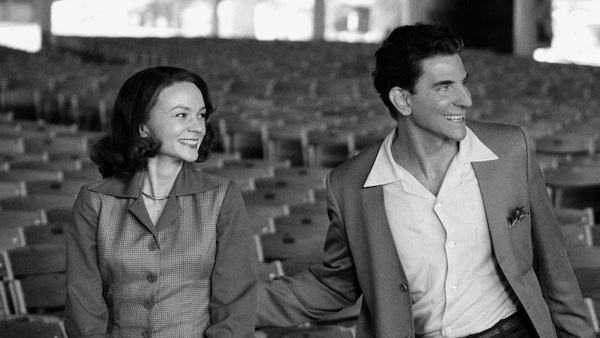New York Film Festival 2023: “Maestro,” Chinese Youth, and a Turkish Teacher
By David D’Arcy
As always, the New York Film Festival was a mix of art films that may never see general release with a few star-laden commercial movies angling for awards.

Carey Mulligan and Bradley Cooper in Maestro. Photo: Netflix
Leonard Bernstein, once almost as beloved as Elvis, launched Lincoln Center in New York sixty years ago. And last week Lincoln Center launched the over-energized Maestro, Bradley Cooper’s tribute to Bernstein, which has the official feel of an authorized biopic.
The film’s producers insist that Maestro is not a biopic. They insist that it’s a drama about the conflicts between the privately-gay Bernstein (in those days) and his actress wife Felicia Montealegre, the mother of his three children, played by a radiant Carey Mulligan, who isn’t working with much more than grief here. Adding to the film’s fervor is Montealegre’s anguished battle with cancer, which killed her in 1978.
Bernstein the charismatic wunderkind led two lives. We see that clearly in a scene in which the telephone awakens him as he is sleeping next to a male lover. Lenny is told that the principal conductor of the New York Philharmonic is ill and that the young Bernstein will be taking over the conducting duties that evening. Guess who celebrates with the dumbstruck Bernstein once he hangs up the phone. And guess who can’t bear the whispering about Lenny’s passionate adventures.
Maestro has majestic moments of (reenacted) concert performances, and they relieve the by-the-book sturm und drang of a frayed marriage. (Cooper received coaching from conductors.) But there’s not much here from Bernstein’s popular successes, such as West Side Story or On the Town, which (like it or not) have overshadowed and could outlive the composer/musician’s more “serious” achievements. Hence the screenplay’s paradox — the film’s quest for a crowd-pleasing popular cinematic portrait of Bernstein ends up concentrating on his “serious” work, shortchanging his genius as a popular artist in the process. (Maybe Cooper and company, and the Bernstein family, who assisted the production, thought West Side Story was successful enough already.)
Director Steven Spielberg, popularizer of everything from the Shoah to the Israeli revenge campaign for the killings at the 1972 Olympics, made his own West Side Story remake. He had originally planned to direct a Bernstein screen saga; it is said he deferred to Cooper on this one.
Film nerds somewhere will debate whether Spielberg’s version would have been better. Yet the quarrel center-stage now is not over whether Cooper got Bernstein right, but whether the nose on the actor’s face is right. And there are those asking whether a Jewish actor might have been better in the role than a performer who augments his nose to “look Jewish.” I’m on the side of the plastic surgeons on this one. Use the best nose, real or fake, on the best actor.
Yet verisimilitude is not this film’s problem. Cooper and his team get Bernstein’s look and his undeniable charisma right enough, along with the fact that he was almost always performing in some way. They do load the black and white period film with plenty of post-war American glitterati atmosphere — party games with the celebs of the day at the Dakota, weekends en famille in Fairfield Connecticut — all activities shrouded in clouds of cigarette smoke. Bernstein smoked even more than Golda Meir, who got her own celebratory screen tribute this year. Helen Mirren, who saved Golda from being worse than what it was, endured attacks for not being Jewish.
At its bleeding heart, Maestro is a melodrama. That means that most of the time, the closer you get to the tempest of Bernstein’s marriage, the farther you get from the music that made him great. Trailer-sized musical selections don’t do it. The result is that, in the film about a great composer and performer, you end up feeling that it’s celebration of two movie stars, Cooper and Mulligan. Remember, Cooper is director/co-writer/star of the latest remake of A Star Is Born, the tearjerker tale of a troubled marriage that spawned sequel after sequel over the last century. But you don’t think about Bernstein’s marital woes when you listen to his music or see his work for the theater, or when you watch him give his Harvard Norton lectures from 1973 (available online). There’s so much more of Bernstein brilliance to discover. Let’s hope Maestro makes that happen after the mass audience eventually sees the film on Netflix.

A scene from Youth (Spring). Photo: courtesy of Gladys Glover, House on Fire, CS Productions and Cannes Film Festival
Youth (Spring), the latest from Wang Bing, takes you to the sweat shops where young people work assembling parts of garments that just might be imported into this country. The film probes one of many undersides of the expanding Chinese economy: it is long (three-and-a-half hours) and repetitive, much like the work its exploited protagonists do.
The young men and women labor in long concrete rooms strewn with garbage, mostly of the fabrics that they assemble – the detritus of their production. They sleep in dormitories, where they drink and sometimes act stupid. Wang Bing looks patiently at these impatient adolescents, watching the tricks they play on each other, which are as annoying as you’ll see from any teenagers, only less violent. Their real fight is with their bosses, who work for larger companies and pass down the higher-ups’ demand for cost-cutting measures, which are inevitably endured by those who do the work.
There’s no socialism here, only stingy capitalism. The individual kids are paid varying rates, which leads to resentment among themselves. If that isn’t Sisyphean enough of a conceit, there is a massive concrete staircase in their housing bloc that visualizes their plight (going nowhere fast) as they constantly rush up and down.
There are some surprises amid the exploitation in Youth (Spring). These young people are remarkably skilled, feeding parts of garments into the machines with an efficient fury as they laugh, curse, flirt, and clown around. We learn that this job, which is paid at minimal piece-work rates, is competitive. If this is a desirable employment opportunity, think of what the other choices might be.
Another surprise is that all this work is done by hand at the sewing machines — less dangerous and noisy than they were forty years ago — by workers who are onlya few steps out of childhood. Somehow the rapid modernization of Chinese industry, the subject of Wang Bing’s grueling nine-hour West of the Tracks (2002), seems to have missed them.
Wang Bing is the dean of Chinese documentarians. His films are financed with funding from outside of China. It’s worked — so far. Youth (Spring), like all of his other non-fiction films, leaves you wondering what he left out.

A scene from About Dry Grasses. Photo: courtesy of the artist
About Dry Grasses, a scripted feature by the Turkish director-screenwriter Nuri Bilge Ceylan, is longer than the lengthy Youth (Spring). Its protagonist, Samet (Deniz Celiloglu), is a schoolteacher in a windswept corner of eastern Anatolia. He is comfortable kidding around with his pupils, and he seems to have a special bond with young Sevim (Ece Bagçi), a bright girl of 14. For all his attachment to the kids, Samet is restless and bored with the countryside. He yearns to relocate to Istanbul. When a letter that Sevim wrote to him surfaces, he faces the charge of improper conduct. A fellow teacher, Kenan (Musab Ekici), is also accused of inappropriate behavior.
Films about teachers in trouble are all over European cinema right now. The Teachers’ Lounge, written and directed by Ilker Çatak, a Turkish-German filmmaker, is Germany’s Oscar nominee. Like About Dry Grasses, it navigates a rocky judicial territory, probing an ambiguous terrain, the borders between perception and reality, probing accusations that may be invented.
Ceylan can’t be accused of leaving his stories uncomplicated. Another woman enters the tale, a teacher named Nuray (Merve Dizdar), who is missing a leg from an injury in a terrorist attack. She and Samet’s colleague Kenan are attracted to each other, as is Samet. Shake well and serve.
Ceylan serves his drama up slowly. His characters are given time to talk and reveal themselves; there are plenty of scenes at tables that feel like exchanges on a theater stage. The director spends time probing the the narrative’s conflicts, and he seems in no rush to resolve them. Eventually, there is some closure to Samet’s scandal, yet the solution to the real crisis, his stay in the hinterlands, is left up in the air. The characters’ rambling talks have led critics to suggest comparisons with Chekhov. And, as in those Russian dramas of detachment and ennui, the characters in About Dry Grasses avoid talking directly about politics, a safe approach in Turkey, as it was in Chekhov’s day. That said, I don’t know of a Chekhov play that’s as long as this film.
In a sobering image that Ceylan returns to throughout, we see fields and hills covered with snow – austere, but august. Samet is trapped, not in a cell, but in a vast landscape, beautiful but confining. When warmer weather arrives, the camera comes in closer to examine the dry grasses of the title, which somehow survive in the parched ground. They have adapted far more effectively than our protagonist has. Samet’s confinement, as he sees it, extends as far as he can see. As the Turkish audience knows well, there are more windswept hills over the horizon.
David D’Arcy lives in New York. For years, he was a programmer for the Haifa International Film Festival in Israel. He writes about art for many publications, including the Art Newspaper. He produced and co-wrote the documentary Portrait of Wally (2012), about the fight over a Nazi-looted painting found at the Museum of Modern Art in Manhattan.
Tagged: About Dry Grasses, Bradley Cooper, New York Film Festival 2023, Nuri Bilge Ceylan, Wang Bing

